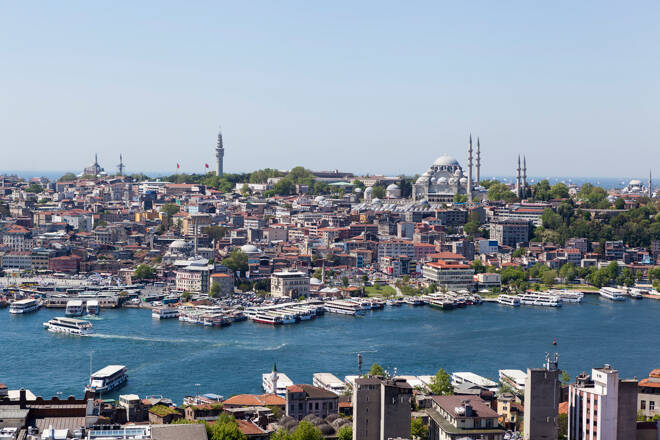Advertisement
Advertisement
Turkey: Political Interference At Central Bank, Weak Lira Risk Policy Mistakes Ahead Of Elections
By:
The Turkish lira fell to new lows this week, equivalent to a 19% slump against the dollar since February. Economic mismanagement has intensified the currency crisis. Policy-related risk is likely to remain elevated ahead of planned elections in 2023.
Structural depreciation of lira – averaging 17% annual losses against the dollar since 2015 – and increased state intervention to slow currency devaluation have reduced the domestic sector’s confidence in the lira.
The proliferation of cryptocurrencies as investors seek protection is a sign of a growing currency crisis. Unless the authorities reverse policy missteps, growing domestic loss of trust in the currency risks structurally higher inflation and balance of payment problems longer term.
Continued heavy political interference into monetary policy
However, President Recep Tayyip Erdoğan’s removal last month of a third senior member of the central bank’s powerful Monetary Policy Committee (MPC) in two months underscores ever greater political interference in monetary policy making. Erdoğan commented publicly of his expectations of a return to single-digit inflation and interest rates this year, and cited on Tuesday July or August as a possible timetable for rates to begin declining.
By stacking the MPC with figures who favour reduced rates, the president has raised the stakes for forthcoming central bank meetings – starting with the session due 17 June. While new central-bank governor Şahap Kavcıoğlu and his deputies will be given some time from the president, the president’s patience is waning.
Pressure for easing rates at odds with elevated levels of inflation
Pressure for more accommodative monetary policy remains at odds with Turkey’s high inflation rate, running at an annual 16.6% in May. Any easing of Turkey’s currently significant positive real benchmark interest rate of 2.1% could make the economy more vulnerable to capital outflows, lira depreciation and higher inflation.
The central bank is in a bind: it may have a tacit mandate to hold rates unchanged for a short period, but likely does not have one to hike rates should this be later required.
Policy missteps partially reflect Erdoğan’s party’s poor ratings in polling
Policy missteps are partially a function of Erdoğan’s attention on the latest opinion polling. They suggest all-time lows in support for the president’s AK Party and rising popularity of the President’s possible rivals in the next presidential elections – such as Istanbul Mayor Ekrem İmamoğlu and Ankara Mayor Mansur Yavaş.
In view of the criticism of the management of the economy, the president feels pressure to reverse the course of the economy during this Covid-19 crisis. Unfortunately, in the past, Erdoğan has given priority under such conditions to supporting higher short-run economic growth, rather than seeking to correct underlying economic imbalances and achieve sustainable longer-term growth.
GDP expanded 7% YoY in the first quarter, supported by lira lending growth of 25% YoY in April.
Increase in pre-election economic and institutional risk
Importantly, Erdoğan is unlikely to simply step aside in next elections. If he cannot engineer higher economic growth and higher employment to reverse declining popularity, he could resort to more significant oppression of his political opponents, intensifying economic and institutional risks ahead of the vote by 2023.
Degradation of economic policies leads decline in official reserves
The degradation of economic policy making has led to some decline in central bank foreign-currency reserves – after more than USD 100bn of reserves were spent in defence of lira in 2020 alone. Gross reserves stood at USD 92.4bn on 23 May – roughly unchanged from levels as of end-2020 – but swap-adjusted net reserves remained near all-time lows at negative USD 54.3bn in April.
In part, loss of official reserves has reflected impact of the pandemic on tourism revenues, contributing to deterioration in the current-account balance to -5% of GDP in the year to March 2021 from a 1.7% of GDP surplus in the year to August 2019.
It is difficult to see how structural deterioration in fundamentals could be easily reversed with Erdoğan increasingly in the driver’s seat over economic policy.
Our next scheduled review of Turkey’s B/Negative foreign-currency credit ratings is on 10 September.
For a look at all of today’s economic events, check out our economic calendar.
Dennis Shen is a Director in Sovereign and Public Sector ratings at Scope Ratings GmbH.
About the Author
Dennis Shencontributor
Dennis Shen is the Chair of the Macroeconomic Council and Lead Global Economist of Scope Ratings based in Berlin, Germany.
Advertisement
